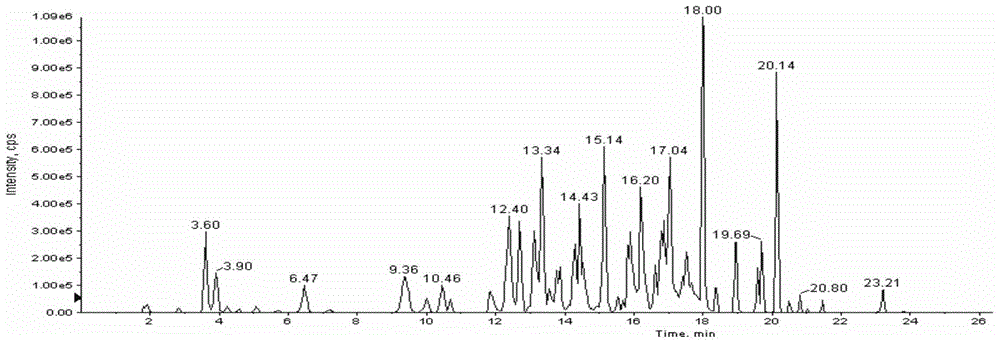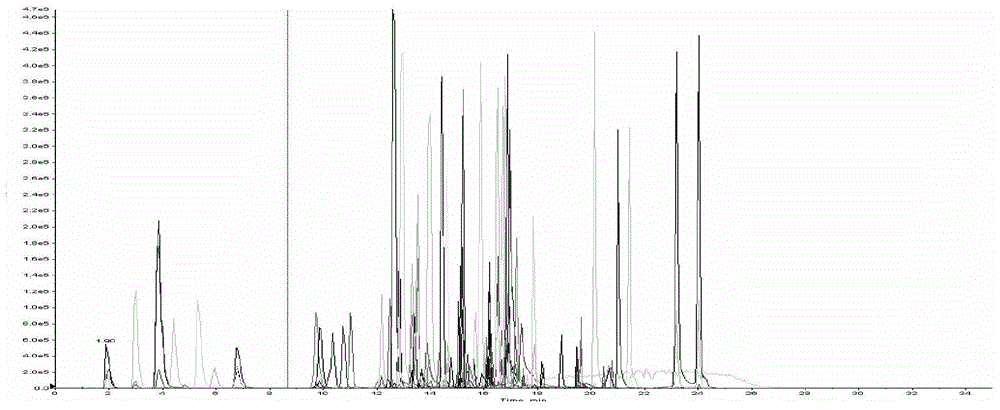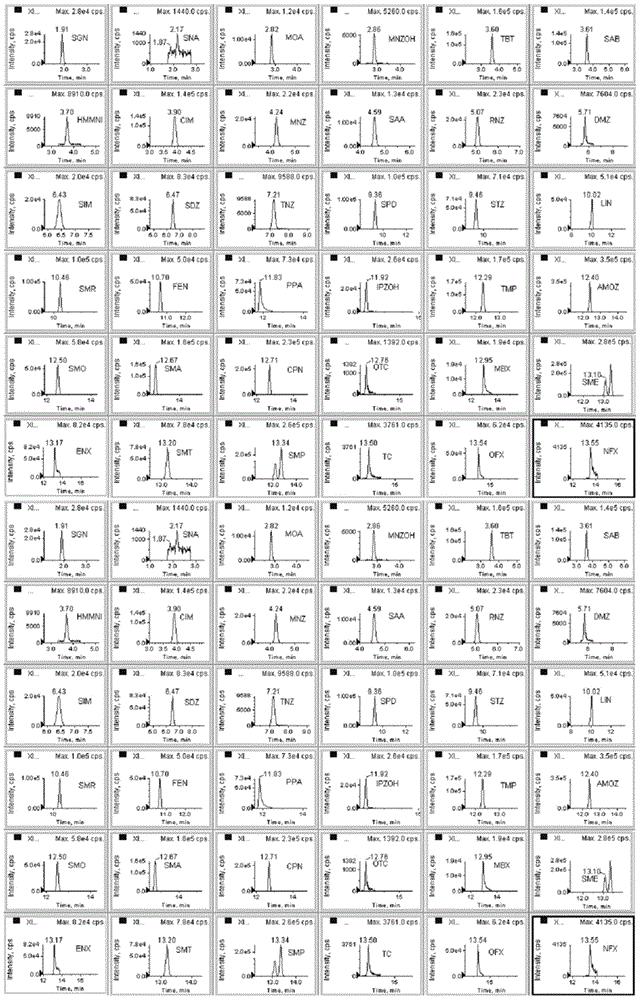Method and liquid mass database for detecting chemical residues in animal-derived food
A technology for detecting animals and animal sources, applied in the direction of measuring devices, instruments, scientific instruments, etc., can solve the limit requirements and use regulations, there is no unified pretreatment method coupled with instrument analysis, and multi-type residue detection verification rules Issues not yet perfect
- Summary
- Abstract
- Description
- Claims
- Application Information
AI Technical Summary
Problems solved by technology
Method used
Image
Examples
Embodiment 1
[0109] Embodiment 1. Preparation of standard working solution
[0110] Mixed standard working solution of 99 substances (0.5mg / L): Pipette 0.5mL of each of the above mixed standard stock solutions (except the mixed standard stock solution of nitrofuran metabolites and their 2-nitrobenzaldehyde derivatives) into a 10mL volumetric flask , dilute to the mark with acetonitrile, and mix well. The solution is stable at -20°C for 1 month;
[0111] Mixed standard working solution of 101 substances (0.5mg / L): Pipette 0.5mL of each of the above mixed standard stock solutions (except the mixed standard stock solution of nitrofuran metabolites) into a 10mL volumetric flask, dilute to the mark with acetonitrile, and mix uniform, the solution is stable at -20°C for 1 month;
[0112] Mixed standard working solution of nitrofuran metabolites (0.5mg / L): pipette 0.5mL of mixed standard stock solution of nitrofuran metabolites into a 10mL volumetric flask, dilute to the mark with acetonitrile, ...
Embodiment 2
[0113] Embodiment 2. Analysis pretreatment method
[0114] For the pretreatment optimization of 103 target compounds (group B substances), the concept of the experimental design is as follows: (1) the simpler the pretreatment process, the better; (2) choose a broad extraction solvent; (3) reduce the solvent dosage, while avoiding the loss of target analytes caused by solvent conversion as much as possible; secondly, the analysis of target analytes and matrix is as follows: (1) Hormone substances and β-receptor agonist substances in target analytes need to be released by enzymatic hydrolysis Bound state residual drugs; (2) The determination of nitrofuran metabolites requires acid hydrolysis and derivatization processes; (3) The types of sample matrices selected are quite different, including solid animal tissues (such as muscle) and liquid animal-derived products (milk); (4) There are prohibited substances and restricted substances in the target analyte.
[0115] The specifi...
Embodiment 3
[0127] Embodiment 3. Research on one-time sampling chromatographic analysis system
[0128] 1. Selection of chromatographic column
[0129] Ultrafine particle (particle size <2 μm) chromatographic columns are usually considered for liquid chromatographic separation of multi-target analytes. However, this study uses a conventional HPLC system with a pressure upper limit of 400 Bar, so ultra-high performance liquid chromatography columns cannot be used. In order to achieve the separation purpose of the design, considering the system pressure limitation, the particle size range of the chromatographic column is controlled between 2 μm and 3 μm, and the length of the chromatographic column is 100 mm to 150 mm; In terms of chromatographic column type, a C18 chromatographic column suitable for separating a wide polarity range was selected. Through the above limitations, this study selected one of each type of compound based on polarity (selected with reference to the LogD value), an...
PUM
| Property | Measurement | Unit |
|---|---|---|
| Particle size | aaaaa | aaaaa |
| Length | aaaaa | aaaaa |
Abstract
Description
Claims
Application Information
 Login to View More
Login to View More - R&D
- Intellectual Property
- Life Sciences
- Materials
- Tech Scout
- Unparalleled Data Quality
- Higher Quality Content
- 60% Fewer Hallucinations
Browse by: Latest US Patents, China's latest patents, Technical Efficacy Thesaurus, Application Domain, Technology Topic, Popular Technical Reports.
© 2025 PatSnap. All rights reserved.Legal|Privacy policy|Modern Slavery Act Transparency Statement|Sitemap|About US| Contact US: help@patsnap.com



